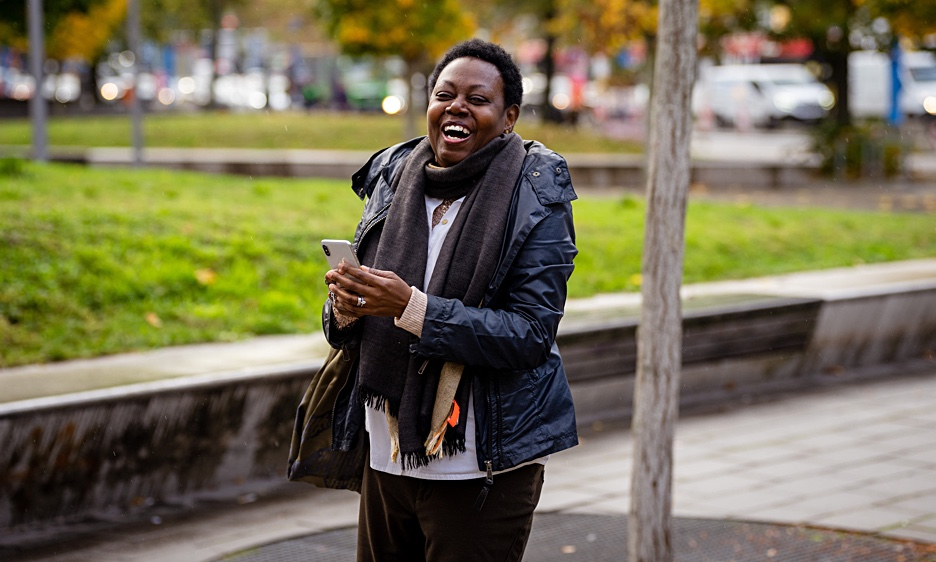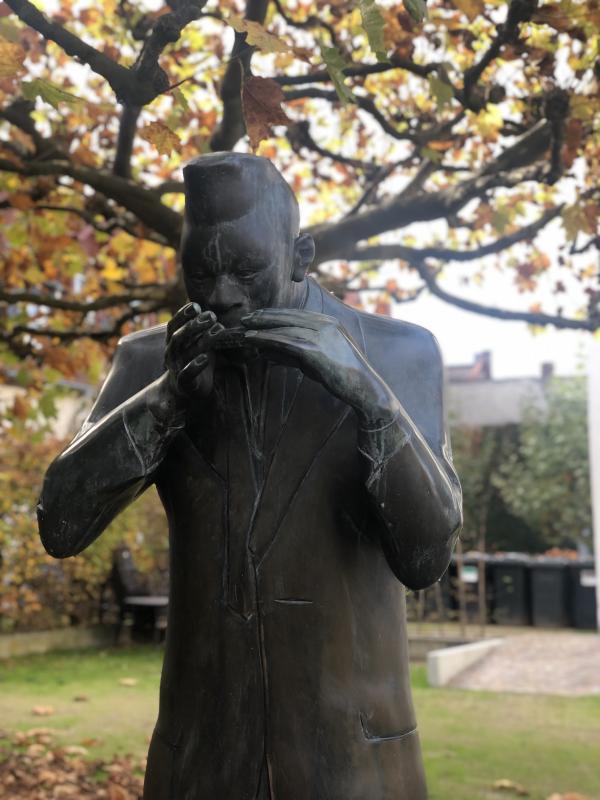Home » Jazz Articles » Interview » Changamiré: Snapshots of Germany Refine A Self-Portrait
Changamiré: Snapshots of Germany Refine A Self-Portrait

Courtesy Markus Werner
I liked this idea of being an ambassador, in this instance representing the US in Germany.
—Changamiré
Co-developed by the Federal Foreign Office in collaboration with the Goethe-Institut, the European Academy Berlin, and Initiative Musik, Jazz from Germany brings together participants from various regions and countries to learn more about the art and business of jazz in Germany. The October 2022 delegation which included the Washington, D.C.-based singer included artistic representatives from Brazil, Kenya, Mexico, Montenegro and Vietnam.
Changamiré began singing in jam sessions in and around Washington, DC, when she was only 18. She has studied music with pianist Glenn Turner and saxophonist Charlie Hampton; and studied singing with vocalists Ronnie Wells and mezzo-soprano Valerie Eichelberger. A recipient of the D.C. Commission on the Arts and Humanities' Artist Fellowship in both 2005 and 2023, Changamiré is finishing her recorded tribute to Billie Holiday as the follow-up to her 2014 release Love.
"I liked this idea of being an ambassador, in this instance representing the US in Germany. I'd love to do that again. I hope to get asked again by some other country," she said. "I really enjoyed that idea of exchanging jazz cultures."
The cultural exchange took place through events in Berlin, Frankfurt and Darmstadt, organized and conducted by Initiative Musik. "Initiative Musik helps distribute funds for the arts from the German government, though they tend to say from the German state," explained Changamiré. "Initiative Musik was also our host."
"The amount of money that Germany dedicates to the arts annually, something like 200 million Euros, is amazing" she continued. "A lot of that is dedicated to classical music but all different genres are supported with these funds. Germany also allocates money to support music venues, including jazz clubs, not just artists.
"Initiative Musik hosts a Jazzpreis kind of like the NEA Jazz Masters, which awards 10,000 Euros in something like 20 categories. Three or four of those categories are for artists anywhere in the world, and I'm definitely applying for that prize when I finish my next album."
Reflections in Berlin
Initiative Music coordinated a networking event at a jazz club (Kunstfabrik Schlot) in Berlin, where the six delegates were individually introduced to representatives from more than a dozen professions in the German jazz industry. "There were artists, agents, managers and club owners introducing themselves and finding out how we can work together or help each other," Changamiré recalled. "One was the booking agent of the artists management arm of Germany's biggest jazz label. It was just this sense of a melting pot: They all ascended on this city, this area, for one reason or another. It was great. They were great. They were all jazz."The delegates also attended a performance by Aki Takase's JAPANIC at Berlin's world-famous jazz club A-Trane, led by the Japanese pianist and featuring trombonist Nils Wogram. "That performance was absolutely transporting. It was avant-garde yet weird in that it was traditional," Changamiré explained. "It colored outside of the lines but it was soft and traditional—that's how it was weird. I know she was pushing the boundaries, but I didn't feel like it was unfamiliar."
Jazzinstitut Darmstadt
After attending the Deutsches JazzFestival in Frankfurt, the delegation traveled to Darmstadt to tour the world-famous Jazzinstitut. Each floor overflowed with rows and rows of jazz books and albums, posters and photos, forming one of the world's largest jazz archives—jazz collector Valhalla. "But before you get to the building, you see a life-size stone statue of Little Walter Horton. Look at the building, up at the top, and the weather vane is a trumpet," the singer recalled. "If you're not really looking and trying to enjoy the moment, you'll miss that trumpet. It was the coolest thing I have ever seen. I could go on and on about the Jazzinstitut."
Vibraphonist Christopher Dell delivered a solo performance for the delegates in the Institut's basement jazz club. Armed with only his instrument and a stopwatch—no written music or arrangements—Dell performed for precisely six minutes. He stopped and read something about the meaning of his work or life, and then reset the stopwatch and repeated the cycle twice for a total of three times. "Time being the only limitation for each piece was extraordinary for me. It inspired me to sing right there an a capella sort of humanitarian piece I'd been working on," Changamiré marveled. "He invited me to come onstage and I said no because he'd just shown me that really doesn't matter where I sit, so I sang right in the chair where I was. The delegate from Vietnam moved and sat beside me. It was such an emotional moment. Everyone was in tears."
Bringing It All Back Home
What were the most important memories and lessons that Changamiré brought back from her Jazz from Germany experience for herself, and for her work? "First, I want to thank the German Embassy and the Goethe Institute in Washington, D.C. for inviting me to this experience. I hope I served them in their mission as well as that experience served me. You can see it's changed me," she began. "A-Trane is sort of the premier jazz club but B-Flat is another jazz club in Berlin. We were taken there on Tuesday night for a jam session. A jam session—not major names—a jam session of local musicians," she continued. "That place was packed to the brim. The line went out the door and we were sitting on the steps that led into it. For a Tuesday night jam session. That love for the music impressed me more than anything else I saw there."
Changamiré also plans to refine specific business and creative aspects of her own work based on this experience. "After meeting the artists and managers in that networking event, I want to explore getting a manager. I could use help with managing my career," she allowed.
"I am so methodical about my performance, whether studio or live—very by the book. In fact, I always say I'm not really a jazz musician because I don't improvise and it's been due, I thought, to a lack of formal education in music theory and me being sort of afraid that I would, you know, mess up," she continued. "But then I took a music theory class. And then I saw Isaiah Collier, someone from my own homeland, perform in Frankfurt. That performance was so improvisational, it was transporting. It was indescribable in that room. Christopher Dell at the Jazzinstitut Darmstadt limited only by six minutes. Aki Takase putting a DJ [DJ Illvibe] in her set, making me feel like I'm listening to jazz. Now I'm craving improvisation in my own performances. Improvisation is the biggest thing. That's deep for me.
"The final thing I want to share is about watching Lakecia Benjamin and Isaiah Collier & The Chosen Few perform on the main stage of the German Jazz Festival in Frankfurt toward the end of our trip. I was mostly around Europeans, seeing and hearing new European perspectives on the sound of jazz music. To see Black American artists on that stage meant a lot. They were extraordinary and I was proud. During my standing ovation for Isaiah, I remembered that jazz originated in the U.S."
Photo of Little Walter statue courtesy of Changamiré.
Tags
Interview
Changamire
Chris M. Slawecki
United States
District Of Columbia
Washington
Glenn Turner
Charlie Hampton
Ronnie Wells
Billie Holiday
Aki Takase
Nils Wogram
Little Walter Horton
Christopher Dell
Isaiah Collier
Lakecia BENJAMIN
Isaiah Cole
PREVIOUS / NEXT
Support All About Jazz
 All About Jazz has been a pillar of jazz since 1995, championing it as an art form and, more importantly, supporting the musicians who make it. Our enduring commitment has made "AAJ" one of the most culturally important websites of its kind, read by hundreds of thousands of fans, musicians and industry figures every month.
All About Jazz has been a pillar of jazz since 1995, championing it as an art form and, more importantly, supporting the musicians who make it. Our enduring commitment has made "AAJ" one of the most culturally important websites of its kind, read by hundreds of thousands of fans, musicians and industry figures every month.
























